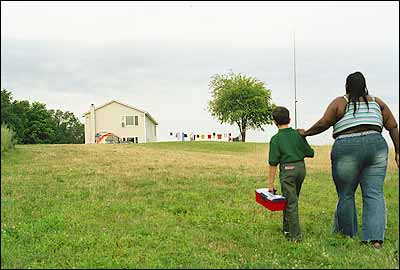
I had a miserable time watching director Todd Solondz’s Palindromes—twice in the space of six months, in fact—but that doesn’t mean it’s not an interesting film: Solondz is the Morrissey of movie misery, never more blithe than when he’s bleak. When I first caught a glimpse of Solondz’s latest denial of the joy life can bring, I was at the New York Film Festival last fall, and the audience around me guffawed at a sunny, Midwestern born-again Christian named Mama Sunshine (Debra Monk), whose home is a haven for various children with an array of disabilities. The laughs were loud when Mama Sunshine (who bakes droplet-shaped “Jesus Tears” cookies, and tells children they’re “pure and innocent” but also informs them of a nearby dump filled with aborted fetuses) says wistfully that one of her adopted girls once “ran away, and she didn’t even have any legs.” The amusement that line provoked just hardened my annoyance with the film’s mostly stiff acting and intentionally flat, banal dialogue. There he goes again, I thought of the director of Welcome to the Dollhouse (1995) and Happiness (1998): Solondz prods his audiences into feeling smugly superior to his supposedly clueless characters. But looking at Palindromes again two weeks ago, it struck me that the no-legs line was something a blissfully baffled woman like Mama Sunshine would say (she’s the sort of person who can’t imagine why anyone might want to flee a house filled with ceaseless worship and religious sloganeering), and that Palindromes is, at least in its best moments, an honest grappling with belief systems prominent outside of Manhattan and Los Angeles.
The movie is a semi-sequel to Dollhouse, dedicated to that film’s heroine, Dawn; Palindromes starts at her memorial service and focuses on her cousin, Aviva, a teenage girl played over the course of Palindromes by seven different actresses and one actor. Solondz wants to universalize Aviva—from scene to scene, she’s played by a skinny white girl, an obese black girl, or a non-teenaged Jennifer Jason Leigh. She’s an all-purpose innocent who, seeking love and comfort in the world, is preyed upon and manipulated.
Which, of course, is where Solondz gets up to his usual morbid, dismaying tricks. “Aviva” is the palindrome of the title, and the director makes one character (Matthew Faber’s Mark Wiener from Dollhouse) his mouthpiece, informing us that just as the name is the same spelled backward or forward, so it is that “whether you’re 13 or 50, you’ll always be the same. There’s no free will.” Richard Masur, as Aviva’s father, provokes another cheap laugh by hosting a limp backyard barbecue where he tells his morose daughter he’s grilling “teriyaki soy dogs—your favorite!” It’s yet another moment when Solondz compulsively heaps condescension and scorn on East Coast suburbs.
But then Aviva lights out for the territory—a female Huck Finn with a frown of discontent. She’s picked up by a truck driver (Stephen Adly-Guirgis) who has sex with her, abandons her, and who later proves to be in league with Mama Sunshine’s husband in a plot to murder a doctor who performs abortions. Palindromes has few stars in its most crucial roles (the biggest names—Leigh as one brief Aviva embodiment, and Ellen Barkin as Aviva’s mother—are terrific in small parts). And this trip beyond New Jersey backyards does the movie some good. Sharon Wilkins as—sorry, there’s just no other way to identify her—the obese black Aviva may be an amateurish performer, but she possesses a sweetness Solondz allows to glow, and Debra Monk is marvelous as Mama Sunshine; the bright-eyed actress triumphs over Solondz’s attempts to render her bovine-naïve. And the castaway strays whom Sunshine takes into her home form a vocal group—half ’NSync, half Polyphonic Spree—that sings spirited songs with lyrics like “Everybody has a right to be born.” This Solondz tableau isn’t designed to induce snickers—the music is catchy and the kids are charming, no matter what you think of their “message.”
Some early reviews have speculated that Palindromes will offend and inflame conservative-Christian viewers. Fat chance. With his mostly blank, affectless characters and depressing dirtying-up of sex, Solondz has pretty much guaranteed that Palindromes won’t play anywhere except the big-city art houses patronized by jaded, worldly audiences used to this “provocative” stuff. If Solondz wants to make a movie that leads a viewer to question his or her beliefs, he’ll have to rejoin the rest of humanity and film them as something other than curious grotesques. Allow his characters to smile occasionally, maybe—give them (and us) the benefit of the doubt. Because otherwise, no one, except maybe a movie critic, is likely to watch Palindromes twice to unearth the shards of insight buried in the director’s stinky mulch of despair.
Palindromes
Directed by
Todd Solondz.
Wellspring. Unrated.